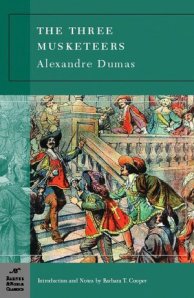Popular culture has absorbed much of the mythology surrounding Dumas’ Three Musketeers as characters, most notably their signature idiom, “All for one and one for all.” It is funny to realize that that famous line is only used a handful of times in the hundreds of pages Dumas’ first novel in his D’Artagnan trilogy. More surprising is just how well Dumas’ novel stands the test of time.
Not a very popular period of history in today’s historic fiction market, The Three Musketeers enthusiastically presents a romanticized version of life as a member of the swashbuckling King’s Musketeers during the reign of Louis XIII when they were competing with Cardinal Richelieu and his men for the king’s attention and support. The young and intelligent D’Artagnan embarks on a personal mission to become one of his Majesty’s Musketeers and after getting himself into a difficult situation, he proves his abilities and befriends three of the more renowned Musketeers (which only helps his case as he moves through the ranks of the guards to become a Musketeer in his own right).
Outsmarting and outmaneuvering Richelieu’s men at every turn and taking on Milady, the religious figure’s most competent and cunning agent, D’Artagnan and his friends engage the reader’s attention and sympathies. In many ways, they are just as ruthless towards their enemies as the cardinalists they bring down, but Dumas’ romantic style keeps the reader firmly encamped on the side of the Musketeers. Dumas even has both sides in the unspoken battle acknowledge their respect for the shrewd planning of the other (Richelieu’s disappointment that he cannot convince D’Artagnan or his friends to ally themselves to his intentions creeps up on a number of occasions).
With plenty of intrigue, plotting, and racing against time, the pacing and scale of the novel still work for a modern audience. There are a few instances where the narrative digresses into trivialities. This happens most often when the main characters are forced to split up and the circumstances of each are recounted through the time they finally meet up again (perhaps the most tedious digressions involve their always tenuous financial situations).
What struck me most about the difference between the popular images of the book and actually reading the novel is how much the four friends’ lackeys are left out (and how much of a role they play in the course of the novel’s events). Treated as extensions of the Musketeers they serve, Planchet, Grimaud, Mousqueton, and Bazin can be intriguing characters in their own right. I can’t help but wonder if someone has already tackled a Rosencrantz and Guildenstern Are Dead approach to the four companions. As appealing as the novel already is, I can’t help but think that the lackey’s opinions, untainted by the Musketeers’ perceptions of them, would dial down the fanciful adventure aspects and create more of a comedic tone.
Similarly, my mind wandered to what might have been if Dumas had tackled the equally dubious English court during the reign of Henry VIII (if he could generate such an intricate plot during the reign of Louis XIII, imagine what could he have accomplished with the rich material provided by Tudor England). I look forward to the next installment, Twenty Years Later, often passed over in favor of the conclusion to the trilogy, The Man in the Iron Mask.

I might have to give this book a try finally. I read The Count of Monte Cristo a long time ago and loved it, but haven’t tried other books by Dumas. I hope they have the same charm.
LikeLike